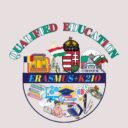The activities
Event 1: Bring Your Objects Race
The participants were divided into two large groups by the instructor, and each group member was assigned a number equal to the number of participants. The instructor divided the participants into 4 groups, drawing up his own plan and assigned numbers from 1 to 5 to the members of the 4 groups. The instructor showed a sheet of paper written on the screen, first with a number (1, 2, 3, 4, 5) and then with an object (remote control, charger, toilet paper, book, salt shaker, etc.). People with the same number in both groups competed to bring the respective object. The person who brought it first and showed it to the camera won a number for his group. The group with the most points was the winner of the game.
Event 2: Take the shape of an object
The instructor played music from his computer using the audio sharing function. The participants danced on the screen to the rhythm of the music. When the music stopped, the participants tried to take the shape of the object the instructor said. Example objects: Key, lantern, pot, airplane, scissors…
More about: Drama game presentation
This events was first played and recorded by the GEEA Tecuci Science Club Association, being taken as a model by other organizations, which implemented the same game in their schools.
The drama play: https://youtu.be/nRLp6eXGbII
After:
The teachers organized an online meeting and discussed the results of the drama activity. They prepared a presentation on the advantages and disadvantages of drama event.
In addition, the GEEA Tecuci Science Club Association proposed a new drama game: The vivant paintings. This was also implemented by the partners.






In our Erasmus project, drama activities provided students and participants with opportunities to learn foreign languages, develop their cultural awareness, communication skills and self-confidence. Drama activities encouraged learning in a fun and interactive way and helped participants to communicate better. Learning drama techniques was important to achieve the objectives of our project.The following skills were acquired through the use of drama techniques:
Language learning: Drama activities supported language learning. Participants were able to create dialogues in different languages and played games to improve their language skills. This provided development for people who are hesitant to speak.
Teamwork: Drama activity encouraged participants to work together. It improved teamwork skills.
Development of Emotional Intelligence: In the drama activities, participants learned to empathize and develop emotional intelligence skills by portraying different emotional situations. It increased the self-confidence of the individuals.Social Skills: Drama activities helped participants improve their social skills. Participants gained experience in backstage collaboration, empathy and intra-group relationships. The use of body language helped in personal expression. It increased a person’s creativity and improvisational capacity. It allowed students to improve their skills in areas such as painting, theater, music and the use of materials.
The results:
CONCRETE RESULTS: The prepared drama activities; Presentation of advantages and disadvantages of drama techniques; Lesson plan prepared with drama activities (8 in total, 2 from each partner institution);
INTANGIBLE RESULTS: Teamwork skills develop; Ensuring creativity and aesthetic development; Improving critical thinking ability; Social development and development of collaborative skills; Improving communication skills; Improving language skills; Developing imagination; Improving people’s observations of other people, situations and natural events;
